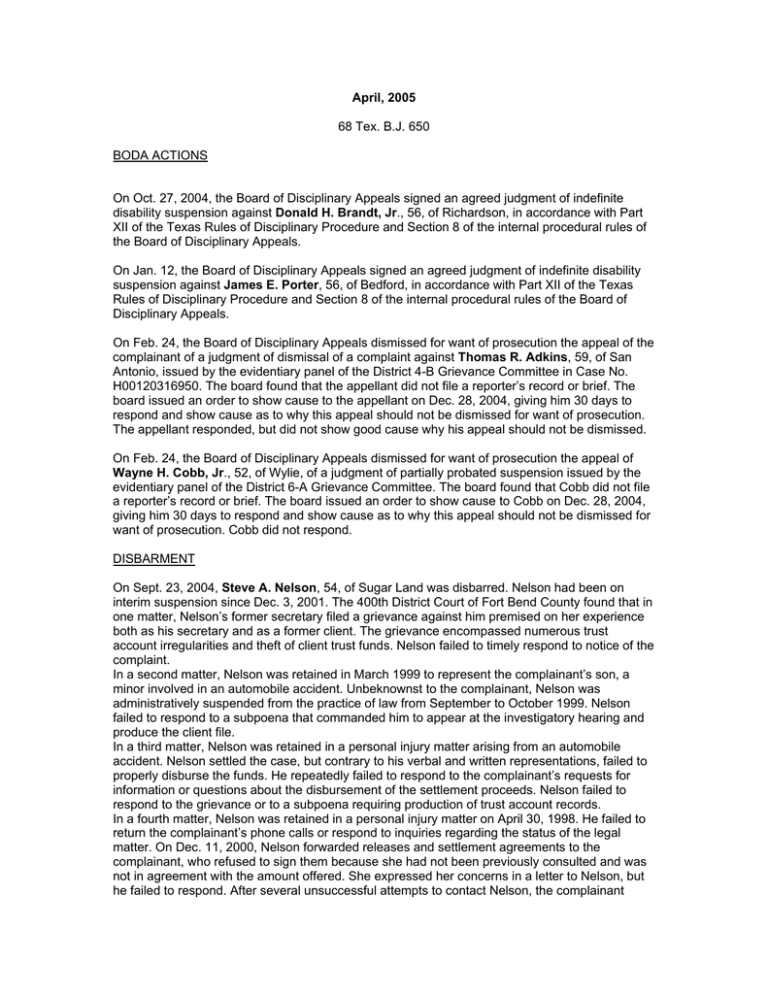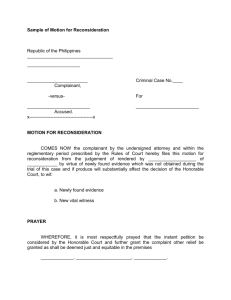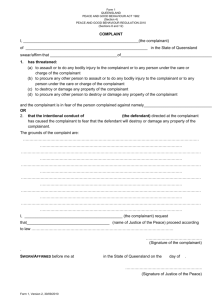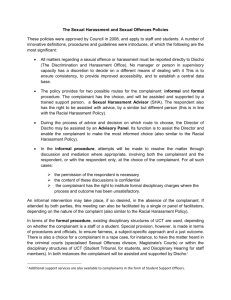April, 2005 68 Tex. B.J. 650 BODA ACTIONS
advertisement

April, 2005 68 Tex. B.J. 650 BODA ACTIONS On Oct. 27, 2004, the Board of Disciplinary Appeals signed an agreed judgment of indefinite disability suspension against Donald H. Brandt, Jr., 56, of Richardson, in accordance with Part XII of the Texas Rules of Disciplinary Procedure and Section 8 of the internal procedural rules of the Board of Disciplinary Appeals. On Jan. 12, the Board of Disciplinary Appeals signed an agreed judgment of indefinite disability suspension against James E. Porter, 56, of Bedford, in accordance with Part XII of the Texas Rules of Disciplinary Procedure and Section 8 of the internal procedural rules of the Board of Disciplinary Appeals. On Feb. 24, the Board of Disciplinary Appeals dismissed for want of prosecution the appeal of the complainant of a judgment of dismissal of a complaint against Thomas R. Adkins, 59, of San Antonio, issued by the evidentiary panel of the District 4-B Grievance Committee in Case No. H00120316950. The board found that the appellant did not file a reporter’s record or brief. The board issued an order to show cause to the appellant on Dec. 28, 2004, giving him 30 days to respond and show cause as to why this appeal should not be dismissed for want of prosecution. The appellant responded, but did not show good cause why his appeal should not be dismissed. On Feb. 24, the Board of Disciplinary Appeals dismissed for want of prosecution the appeal of Wayne H. Cobb, Jr., 52, of Wylie, of a judgment of partially probated suspension issued by the evidentiary panel of the District 6-A Grievance Committee. The board found that Cobb did not file a reporter’s record or brief. The board issued an order to show cause to Cobb on Dec. 28, 2004, giving him 30 days to respond and show cause as to why this appeal should not be dismissed for want of prosecution. Cobb did not respond. DISBARMENT On Sept. 23, 2004, Steve A. Nelson, 54, of Sugar Land was disbarred. Nelson had been on interim suspension since Dec. 3, 2001. The 400th District Court of Fort Bend County found that in one matter, Nelson’s former secretary filed a grievance against him premised on her experience both as his secretary and as a former client. The grievance encompassed numerous trust account irregularities and theft of client trust funds. Nelson failed to timely respond to notice of the complaint. In a second matter, Nelson was retained in March 1999 to represent the complainant’s son, a minor involved in an automobile accident. Unbeknownst to the complainant, Nelson was administratively suspended from the practice of law from September to October 1999. Nelson failed to respond to a subpoena that commanded him to appear at the investigatory hearing and produce the client file. In a third matter, Nelson was retained in a personal injury matter arising from an automobile accident. Nelson settled the case, but contrary to his verbal and written representations, failed to properly disburse the funds. He repeatedly failed to respond to the complainant’s requests for information or questions about the disbursement of the settlement proceeds. Nelson failed to respond to the grievance or to a subpoena requiring production of trust account records. In a fourth matter, Nelson was retained in a personal injury matter on April 30, 1998. He failed to return the complainant’s phone calls or respond to inquiries regarding the status of the legal matter. On Dec. 11, 2000, Nelson forwarded releases and settlement agreements to the complainant, who refused to sign them because she had not been previously consulted and was not in agreement with the amount offered. She expressed her concerns in a letter to Nelson, but he failed to respond. After several unsuccessful attempts to contact Nelson, the complainant contacted the insurance adjuster and was informed that Nelson settled the case. In February 2001, Nelson promised to rectify the situation, but took no further action on the complainant’s behalf. Nelson neglected the case by failing to timely file suit prior to the expiration of the applicable statute of limitations. He failed to respond to the grievance or respond to a subpoena requiring production of the client file. Nelson violated Rules 1.01(b)(1) and (b)(2), 1.03(a), 1.04(a), 1.14(a) and (b), 8.04(a)(1),(a)(2), (a)(3), (a)(8), (a)(11), and (a)(12). SUSPENSIONS On Dec. 20, 2004, James F. Epo, 36, of Houston received a three-year, fully probated suspension effective Jan. 1, 2005. Epo was retained in a personal injury matter. He filed suit which was dismissed for want of prosecution. He did not communicate this to the complainant. During the investigatory hearing, Epo represented to the grievance committee that he had asked the complainant for funds to prosecute the case, a representation that was not true. Epo’s interest in not expending his own funds in the prosecution of the suit adversely limited his ability to represent the complainant. After Epo filed suit, he failed to perform any meaningful legal services on behalf of the complainant. Epo violated Rules 1.01(a) (1), (b) (1), and (b) (2), 1.03(a), and 1.06(b) (2). On Jan. 5, Stewart A. Feldman, 51, of Houston accepted an 18-month, fully probated suspension effective Jan.1, 2005. In one matter, Feldman was retained to represent a company in two cases. Feldman had previously been retained by the former owner of the company, who was a defendant in both cases. Feldman permitted his own interest in collecting money to adversely limit his representation of the company and the former owner. Feldman elevated his interest in protecting payment of its fee bills above his client’s interests in resolving the pending litigation. Feldman practiced law while administratively suspended from the practice of law for failing to comply with minimum continuing legal education requirements. In a second matter, Feldman commenced representation of the complainant in a matter related to damage to a condominium unit the complainant rented from a partnership represented by Feldman. Feldman was the managing partner of the partnership. Feldman alleged that the complainant owed delinquent rent to the partnership. While lawyers from Feldman’s firm filed suit in district court for complainant, Feldman sued the complainant for delinquent rent and forcible entry and detainer of the condominium the complainant rented from the partnership. Feldman permitted his own interest in the real estate partnership to adversely limit his representation of the complainant. In a third matter, an attorney formerly associated with Feldman requested that Feldman remove her name and likeness from his advertising and publications for his businesses. Feldman refused to remove her name or image from a website in a timely manner. His website indicated that other attorneys who were no longer associated with Feldman continue to appear on his website, which is misleading. Feldman violated Rules 1.06(b) (2), 7.02(a), and 8.04(a) (11). On Nov.11, 2004, Edward P. Piker, Jr., 51, of San Antonio received a one-year, fully probated suspension effective Jan. 15, 2005. Piker was retained in a personal injury matter. Piker failed to return the complainant’s telephone calls or keep the complainant reasonably informed about the status of the legal matter. He failed to take reasonable action to pursue the complainant’s claim and did not file suit until three days before the statute of limitations was to expire. Piker violated Rules 1.01(b) (1) and 1.03(a). On Dec. 7, 2004, Alvin N. Saenz, 42, of Houston received a four-year, fully probated suspension effective Dec. 7, 2004. Saenz represented a minor in a personal injury matter. In March 2002, Saenz settled the case. During negotiations with a hospital to reduce the hospital lien, Saenz overstated the case expenses. Saenz requested that the hospital remove its name from the insurance settlement check to be issued by the insurance company. Saenz promised the hospital he would immediately provide a trust account check as collateral, but failed to forward the trust account check. Upon receipt of the settlement funds, Saenz deposited and disbursed the settlement funds to himself and his client. To account for case expenses and deductions from the settlement proceeds, Saenz presented the minor client’s mother with two fabricated letters. She hired another attorney. Saenz later paid the hospital lien and attorney’s fees. During the representation, Saenz was administratively suspended from the practice of law for 14 months for non-payment of bar dues and occupation taxes. Saenz violated Rules 1.14(b), 4.01(a), and 8.04(a) (1), (a) (3), and (a) (11). On Feb. 1, James Michael O’Donnell, 39, of Seabrook accepted an 18-month, fully probated suspension effective Jan.1, 2005. O’Donnell was hired on a contingent fee basis to assume representation of the complainant in a civil lawsuit against an energy company. There was no written contract. O’Donnell failed to amend the pleadings as ordered by the court, respond to the defendant’s motion to strike pleadings, or petition the court for reinstatement of the pleadings. The case was dismissed and O’Donnell filed an appeal. He then informed the complainant that he had unilaterally made the decision to withdraw the appeal. O’Donnell failed to respond to notice of the complaint. O’Donnell violated Rules 1.01(b) (1) and (b) (2), 1.03(b), 1.04(d), and 8.01(b). On Feb. 9, Ronald E. Reynolds, 31, of Katy accepted a four-year, partially probated suspension effective April 1, 2005, with the first 364 days actively served and the remainder probated. Reynolds was retained in three separate matters and neglected each legal matter entrusted to him. He failed to carry out completely the obligations owed his clients, keep them reasonably informed about the status of their cases, or promptly comply with their reasonable requests for information. Reynolds violated Rules 1.01(b) (1) and (b) (2) and 1.03(a). PUBLIC REPRIMANDS On Nov. 3, 2004, Luis Ledesma, Jr., 54, of Angleton received a public reprimand. Ledesma was retained in a small-claims matter. He neglected the legal matter entrusted to him and failed to communicate with the complainant regarding the case. Ledesma was sent notice of the complaint filed against him and was given 30 days to respond to the allegations. He submitted a response stating that he did not deny the allegations and that he had failed to perform his duty in a timely manner on the complainant’s case. He admitted to failure in communications with the complainant. Ledesma violated Rules 1.01(b) (1) and 1.03(a). On Dec. 6, 2004, Jeff Timothy Deason, 52, of Nacogdoches accepted a public reprimand. Deason was retained to expunge a minor in possession charge from the complainant’s record. He filed in the wrong court and then failed to re-file the case. He failed to keep the complainant reasonably informed, promptly comply with reasonable requests for information, or explain the legal matter to the extent reasonably necessary for the complainant to make informed decisions regarding the representation. Deason violated Rules 1.01(b)(1) and 1.03(a) and (b). On Dec. 1, 2004, James W. Spradling II, 51, of Bossier City, La., received a public reprimand. In August 1999, the complainant retained Spradling’s managing partner in a personal injury matter. The partner left the firm and the file was turned over to Spradling. The case was dismissed for want of prosecution on June 4, 2002. The following August, Spradling discovered the complainant’s file in his office and having no notice of the actions taken previously by the court, proceeded to engage in additional discovery. He suffered a fire in his new offices on Jan. 7, 2003. The case file of the complainant was returned to Spradling by the fire-reclamation firm. Upon contacting the court clerks in all outstanding matters, it was discovered that the complainant’s case had been dismissed on June 4, 2002. Spradling notified the complainant about the dismissal in March 2003. The complainant retrieved his file in April 2003. Spradling advised the complainant to seek other counsel, which he did. Spradling cooperated with the complainant’s new counsel. Spradling violated Rules 1.01(b)(1) and 1.03(a). On Jan. 24, G. Carole Daubenmire, 50, of San Antonio received a public reprimand. Daubenmire was retained to assist the complainant with claims against her home mortgage company and pending foreclosure. Daubenmire filed suit in district court and obtained a temporary restraining order to prevent the foreclosure. Daubenmire failed to keep the complainant reasonably informed about the status of the legal matter, notify the complainant that the mortgage company was seeking summary judgment, or file any response or evidence opposing the summary judgment. Daubenmire signed an agreed order granting the summary judgment without the complainant’s consent, failed to timely notify the complainant that the summary judgment had been entered, and misrepresented to the complainant that the judgment was the ruling of the court following a contested hearing. Daubenmire violated Rules 1.01(b)(1), 1.03(a) and (b), and 8.04(a)(3).



